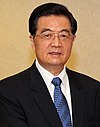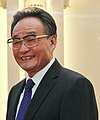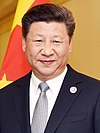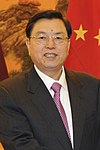
A disaster is an event that causes serious harm to people, buildings, economies, or the environment, and the affected community cannot handle it alone. Natural disasters like avalanches, floods, earthquakes, and wildfires are caused by natural hazards. Human-made disasters like oil spills, terrorist attacks and power outages are caused by people. Nowadays, it is hard to separate natural and human-made disasters because human actions can make natural disasters worse. Climate change also affects how often disasters due to extreme weather hazards happen.

Wen Jiabao is a Chinese retired politician who served as the premier of China from 2003 to 2013. In his capacity as head of government, Wen was regarded as the leading figure behind China's economic policy. From 2002 to 2012, he held membership in the Politburo Standing Committee of the Chinese Communist Party, the country's de facto top power organ, where he was ranked third out of nine members and after general secretary Hu Jintao and Wu Bangguo, chairman of the Standing Committee of the National People's Congress.

Chifeng, also known as Ulankhad in Mongolian, is a prefecture-level city in Southeastern Inner Mongolia, People's Republic of China. It borders Xilin Gol League to the north and west, Tongliao to the northeast, Chaoyang (Liaoning) to the southeast and Chengde (Hebei) to the south. The city has a total administrative area of 90,275 km2 (34,855 sq mi) and as of the 2020 census, had a population of 4,035,967 inhabitants. However, 1,175,391 of those residents lived in the built-up area made of the 2 urban districts of Hongshan and Songshan, as Yuanbaoshan is not conurbated yet. However, a large part of Songshan district is still rural and Yuanbaoshan district a de facto separate town 27 kilometers away from the core district of Chifeng. The city was the administrative center of the previous Ju Ud League.
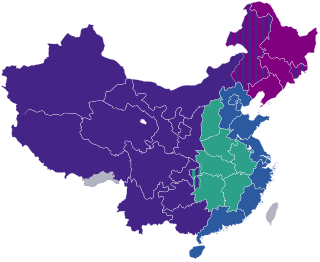
China Western Development (西部大开发) is an economic policy applied in Western China as part of the effort to reduce imbalances in development between China's coastal regions and its interior.
Environmental policy in China is set by the National People's Congress and managed by the Ministry of Environmental Protection of the People's Republic of China. Under the Ministry of Environmental Protection of the People's Republic of China, the Department of Policies, Laws, and Regulations is in charge of establishing and strengthening basic laws and policies such as environmental laws, administrative policies and economical regulations. It is also responsible for the development of national environmental protection policy and macro strategy.
Yucheng County is a county located in the east of Henan province, People's Republic of China, affiliated to Shangqiu City, it is 47.5 kilometers wide from east to west, 67.6 kilometers long from north to south, with an area of 1485 square kilometers. It is adjacent to Liangyuan Park, Shangqiu New District and Yuyang District, bordering the provinces of Shandong to the north and Anhui to the south. It is under the administration of the prefecture-level city of Shangqiu, with a population of approximately 1.08 million and an area of 601.547 square miles (1,558.0 km2). According to preliminary statistics, in 2017, the gross domestic product (GDP) of Lucheng County was 25.72 billion yuan, the total retail sales of social consumer goods was 8.26 billion yuan, the investment in fixed assets was 23.77 billion yuan, the per capita disposable income of urban residents was 25,718 yuan, and the per capita disposable income of rural residents was 10,338. yuan

Urbanization in China increased in speed following the initiation of the reform and opening policy. By the end of 2023, China had an urbanization rate of 66.2% and is expected to reach 75-80% by 2035.
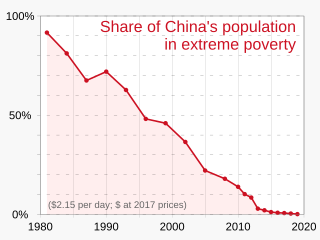
In China today, poverty refers mainly to the rural poor. Decades of economic development has reduced urban extreme poverty. According to the World Bank, more than 850 million Chinese people have been lifted out of extreme poverty; China's poverty rate fell from 88 percent in 1981 to 0.7 percent in 2015, as measured by the percentage of people living on the equivalent of US$1.90 or less per day in 2011 purchasing price parity terms, which still stands in 2022.

The economy of the People's Republic of China is a developing mixed socialist market economy, incorporating industrial policies and strategic five-year plans. China is the world's second largest economy by nominal GDP, behind the United States, and since 2017 has been the world's largest economy when measured by purchasing power parity (PPP). China accounted for 19% of the global economy in 2022 in PPP terms, and around 18% in nominal terms in 2022. The economy consists of state-owned enterprises (SOEs) and mixed-ownership enterprises, as well as a large domestic private sector which contribute approximately 60% of the GDP, 80% of urban employment and 90% of new jobs, the system also consist of a high degree of openness to foreign businesses. According to the annual data of major economic indicators released by the National Bureau of Statistics since 1952, China's GDP grew by an average of 6.17% per year in the 26 years from 1953 to 1978. China implemented economic reform in 1978, and from 1979 to 2023, the country's GDP growth rate grew by an average of 8.93% per year in the 45 years since its implementing economic reform. According to preliminary data released by the authorities, China's GDP in 2023 was CN¥126.06 trillion with a real increase of 5.2% from 2022.

The 2008–09 Chinese economic stimulus plan was a RMB¥ 4 trillion stimulus package aiming to minimize the impact of the Great Recession on the economy of China. It was announced by the State Council of the People's Republic of China on 9 November 2008. The economic stimulus plan was seen as a success: While China's economic growth fell to almost 6% by the end of 2008, it had recovered to over 10% by in mid-2009. Critics of China's stimulus package have blamed it for causing a surge in Chinese debt since 2009, particularly among local governments and state-owned enterprises. The World Bank subsequently went on to recommend similar public works spending campaigns to western governments experiencing the effects of the Great Recession, but the US and EU instead decided to pursue long-term policies of quantitative easing.
The 2nd Session of the 11th National People's Congress was the annual meeting of the highest legislative body of the People's Republic of China, which was held in March 2009 at the Great Hall of the People in Beijing. The event began on March 5 and lasted until March 13. The Congress was followed closely because of the possible impact any policy changes would have on the Chinese and world economy. Major issues discussed at the Congress include the 2007–2008 financial crisis, economy of China, curbing unemployment, and social welfare.
The Five-Year Plans are a series of social and economic development initiatives issued by the Chinese Communist Party (CCP) since 1953 in the People's Republic of China. Since 1949, the CCP has shaped the Chinese economy through the plenums of its Central Committee and national party congresses.

Postal Savings Bank of China Co., Ltd. also known as PSBC is a Chinese retail bank and financial services corporation headquartered in Beijing, China. PSBC provides basic financial services, especially to small and medium enterprises, rural and low income customers. As of 31 December 2017, PSBC has 39,798 branches covering all regions of China. PSBC was ranked #27 in Forbes Global 2000 in 2023.

The economy of Beijing ranks among the most developed and prosperous cities in China. In 2013, the municipality's nominal gross domestic product (GDP) was CN¥1.95 trillion. It was about 3.43% of the country's total output, and ranked 13th among province-level administrative units. Per capita GDP, at CN¥93,213 (US$15,051) in nominal terms and Int $21,948 at purchasing power parity, was 2.2 times the national average and ranked second among province-level administrative units.
The 2014 National People's Congress held its annual meeting in March 2014 at the Great Hall of the People in Beijing, China. The session opened on 5 March and concluded on 13 March.
The national debtof the People's Republic of China is the total amount of money owed by the central government, local governments, government branches and state organizations of China. According to the International Monetary Fund, general government debt amounted to 77% of GDP in 2022. Large-scale infrastructure construction in China has been debt-financed through the use of local government financing platforms (LGFPs) that borrow from banks and issue corporate bonds known as "urban construction and investment bonds" or "chengtou bonds".
The Individual Income Tax in China is administered on a progressive tax system with tax rates from 3 percent to 45 percent. As of 2019, China taxes individuals who reside in the country for more than 183 days on worldwide earned income. The system is separate from the income tax system of Hong Kong and Macau, which are administered independently.
The 11th Five-Year Plan of China, officially the 11th Five-Year Plan for Economic and Social Development of the People's Republic of China, was a set of economic goals designed to strengthen the Chinese economy between 2006 and 2010.
The 2024 National People's Congress (NPC) was the Second Plenary Session of the 14th National People's Congress of the People's Republic of China (PRC). It was held from 5 March to 11 March 2024, concurrently with the Chinese People's Political Consultative Conference (CPPCC) as part of the annual Two Sessions. The NPC was held at the Great Hall of the People in Beijing.
The Tenth five-year plan is a plan for China's national economic and social development for the 2001-2005 period. With economic development as its main goal, the plan establishes the strategic adjustment of the economic structure as its main line, while focusing on ecological construction, environmental protection, and sustainable economic and social development. Various social programs such as education, culture, healthcare and sports were also emphasized.
